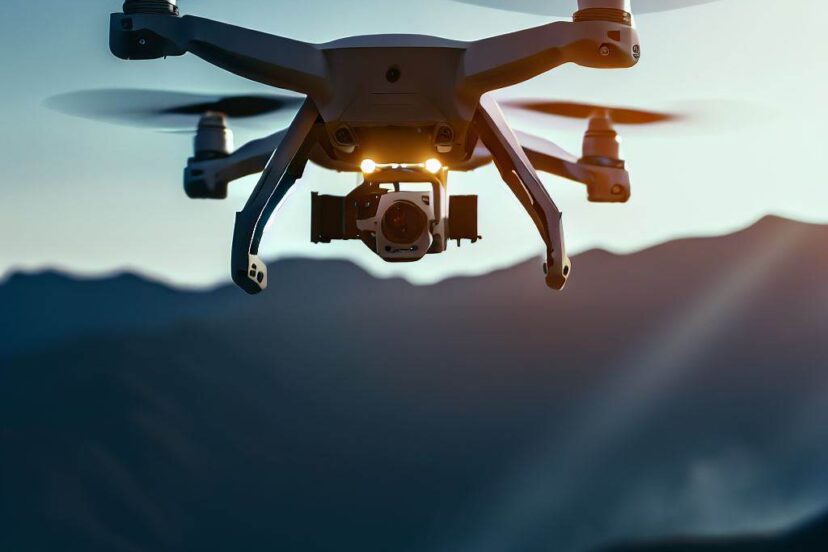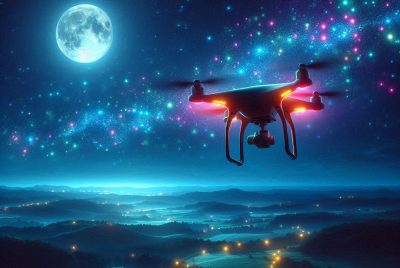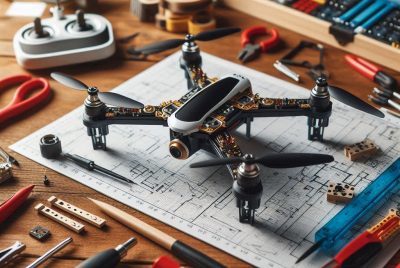Commercial Drones: Revolutionizing Industries
*We may earn a commission for purchases made using our links. Please see our disclosure to learn more.
Commercial Drones: Revolutionizing Industry with Advanced Aerial Technology
Drones have swiftly ascended from hobbyist novelties to indispensable tools in various commercial sectors. With their ability to navigate areas unreachable by traditional means, these sophisticated flying devices offer a unique vantage point that can be leveraged for a myriad of applications including mapping, agriculture, real estate, and surveillance. Equipped with high-resolution cameras, thermal sensors, and advanced navigation systems, commercial drones enable businesses to gather data and imagery with precision and efficiency.
Upon considering a drone for commercial use, it’s essential to take into account the specific requirements of the task at hand. Understanding a drone’s flight time, payload capacity, durability, and camera specifications is crucial since these factors dictate the overall performance and suitability for particular commercial operations. Moreover, regulatory compliance is a critical consideration; commercial drone operators need to adhere to the aviation authority regulations of the countries they operate in, which often include pilot certification and flight authorization.
When in the market for a commercial drone, individuals should prioritize features such as flight stability, data security, and after-sales service to ensure a wise investment. These high-tech devices are an investment in efficacy, capable of transforming how businesses collect data and interact with the environment. Thus, selecting the right commercial drone is a balancing act between quality, capability, and cost.
In my pursuit to guide you through the options available, I conducted extensive research and testing to discern the commercial drones that stand out in performance, reliability, and user-friendliness. My goal is to provide insights that simplify your decision-making process, allowing you to harness the full potential of drone technology within your business domain.
Top Commercial Drones
In my experience, finding the right commercial drone for your business can greatly enhance your operations, whether it’s for aerial photography, surveying, or asset inspection. Each drone comes with a set of features that cater to different industry needs, and I’ve carefully selected a variety of models that stand out in terms of performance, durability, and overall value. These are the commercial drones I recommend if you’re aiming for top-tier results in your professional endeavors.
DJI Mini 4 Pro Fly More Combo
I believe this drone strikes a perfect balance of functionality and convenience, ideal for enthusiasts and professionals looking for a lightweight, capable UAV.
Pros
- Exceptional battery life for extended flight sessions
- Omnidirectional obstacle sensing increases safety
- No FAA registration required for lightweight design
Cons
- Might require registration for commercial use when using specific batteries
- ActiveTrack 360° might have a learning curve for new users
- Goggles for FPV flight sold separately
The convenience of the DJI Mini 4 Pro Fly More Combo becomes evident from the first liftoff. The weight of the drone, under 249 grams, liberates me from the hassle of FAA registration for recreational flights, letting me focus on capturing stunning aerial views. Its portability is a game changer, easily fitting into my travel gear without any burden.
Maneuvering through the skies, I appreciate the sense of security offered by the omnidirectional obstacle sensing; it’s like having a virtual copilot, constantly vigilant and drastically reducing the risk of accidental collisions. This feature is invaluable, especially when navigating new or complex environments.
The extended flight time provided by the three 34-minute batteries is another significant boon. I enjoy the luxury of planning longer shoots without the nagging concern of a dying battery. This combo’s capacity for extended use is a relief when I’m in the zone and want to keep the creativity flowing without interruption.
However, I must keep in mind the additional step of registering the drone for commercial purposes when opting to use the Intelligent Flight Battery Plus. This is a minor inconvenience but necessary for complying with regulations.
While the ActiveTrack 360° feature claims to ease capturing smooth trajectories, it does take some time to master. New pilots may need a few practice runs to get accustomed to the tracking capabilities.
Always at the cutting edge of tech, I find that the DJI Mini 4 Pro Fly More Combo sets a high standard in the realm of commercial drones. It manages to blend industry-leading features with user-friendly design, embodying the advancements of drone technology in a compact package.
Bwine F7 GPS Drone
Picking up the Bwine F7 GPS Drone, I found it offers a versatile and satisfying flying experience that’s tough to match at its price point.
Pros
- Impressive flight stability and wind resistance
- Easy-to-control gimballing for stable, clear images
- Relatively long flight time with multiple batteries included
Cons
- Charging time can be lengthy for impatient flyers
- Bulkier design compared to some competitors
- Advanced features may require a learning curve for beginners
The Bwine F7 GPS Drone certainly raises the bar for aerial photography. Its 4K camera, supported by a 3-axis gimbal, works wonders for clarity–the night shots I captured were nothing short of stunning. When the wind picked up during one of my flights, it held its own impressively well, with performance remaining smooth and responsive.
Battery life is a standout feature; with three batteries included, I was reminded of the importance of flight time. Being able to fly for extensive periods without a recharge is truly liberating. This feature alone makes the F7 suitable for serious hobbyists or professionals in need of substantial air time.
Using the Bwine F7 feels like you’re controlling a high-end piece of technology that’s made user-friendly. The GPS function worked flawlessly — the drone returned to me every single time I tested the one-key return, and following features worked seamlessly. There is a multitude of settings within the app that can enhance the flying and imaging experience. You’re also in for a treat with the shareable FPV view, which can jazz up your social media feeds instantly.
Despite being targeted at adults, I found that the Bwine F7 was easy enough for even beginners to enjoy from the first flight, thanks to the beginner mode. This makes it an alluring option for anyone looking to step into the world of drones. If you can handle the wait while the batteries charge, you’re set for an excellent flight experience you’ll want to come back to again and again.
DJI Mavic 2 Enterprise Advanced
If durability and versatility are what you seek in commercial drones, the DJI Mavic 2 Enterprise Advanced won’t disappoint.
Pros
- Dual-camera setup provides excellent thermal and zoom capabilities.
- Attachments like spotlight and loudspeaker expand its use-case scenarios.
- Compact and lightweight design enhances portability.
Cons
- Priced on the higher side, reflecting its advanced features.
- Requires a learning curve for full mastery of its capabilities.
- Battery life may be limiting for extensive operations.
Having recently taken the DJI Mavic 2 Enterprise Advanced out for a spin, I am quite impressed with its performance. Its thermal and zoom cameras provide clear and precise imagery, crucial for search and rescue or inspection work. In addition, I found the spotlight and loudspeaker attachments to be game-changers during nighttime operations or when trying to communicate in vast areas.
The drone’s compactness was a delight, making it extremely convenient to transport to different locations. It can easily fit into a backpack, allowing me to take it into the field without any hassle. This portability, combined with its robust build, makes it ideal for professionals on the move.
While this drone is a powerhouse, it does come at a steeper price than some other models, which may deter budget-conscious buyers. Moreover, pilots new to commercial-grade drones might find it takes some time to become proficient in using all of its advanced features. During extended missions, I had to plan for the battery life accordingly, which can be a slight hindrance during uninterrupted long-term use.
In essence, the durability, functionality, and portability of the DJI Mavic 2 Enterprise Advanced make it a formidable tool for professionals. I’d recommend it for anyone looking for a high-quality commercial drone capable of performing a wide range of tasks despite its few limitations.
Ruko F11PRO Drone
Having flown the Ruko F11PRO, I find it’s a solid choice if you want a reliable drone with a great camera and flight time, particularly for beginners.
Pros
- Flight time extends up to an hour, which is a bonus for longer sessions.
- User-friendly features make it accessible for beginners to get the hang of flying.
- Strong wind resistance paired with a durable design ideal for outdoor use.
Cons
- Lack of an included charger can be inconvenient.
- The learning curve for mastering controls may challenge some users.
- Camera quality, despite being 4K, may not meet professional filming standards.
Hovering this drone above the landscape, I immediately noticed the stability, thanks to its level 6 wind resistance. It was reassuring to feel the control, especially when a gust of wind swept across the open field where I chose for my initial flight.
The clarity of the 4K camera struck me as I captured the sunset; the colors were vivid against the darkening sky. For a drone marketed towards consumers, I was quite impressed. Yet, when reviewing the footage on a larger screen, the limits of its capabilities became apparent — sufficient, but not professional grade.
Handling the Ruko F11PRO was straightforward. As someone who appreciates gadgets that work right out of the box, the drone’s intuitive design didn’t disappoint. Setting up took minutes, with the majority of the time spent on syncing the drone with my smartphone. Getting familiar with the various flight modes added to the fun, with each offering a unique perspective on my surroundings.
The automatic return-to-home feature was a lifesaver when I flew the drone far enough that I could barely see it. A simple command and within minutes, the F11PRO was back above me, hovering as if it had never left.
For adventurers and beginners alike looking to step into aerial photography, the Ruko F11PRO offers an engaging experience. Sure, there’s room for improvement, notably in image quality for the pros, but overall, it’s a solid drone marked by an undeniably robust set of features.
Holy Stone 4K GPS Drone
If you’re seeking a blend of performance and ease of use in a drone, the Holy Stone 4K GPS Drone ticks most of the boxes for both novice and experienced pilots.
Pros
- Intuitive controls and GPS stability cater to beginners.
- High-quality camera delivers on the promise of clear aerial footage.
- Dual batteries provide an extended flight time.
Cons
- Initial setup might be challenging for some users.
- GPS syncing can be temperamental at times.
- The return-to-home feature can be abrupt, especially with low battery.
Flying the Holy Stone 4K GPS Drone has been a rewarding experience. With its sleek, foldable design, I found it extremely travel-friendly. The 4K camera is impressive, capturing high-resolution images that are nothing short of stunning from an aerial point of view. Moreover, the wide-angle lens has allowed me to capture a more expansive view of the landscape.
During operation, GPS assistance added a layer of security by ensuring the drone returned safely, should it encounter any signal issues or when the battery ran low. It removed the usual anxiety of potentially losing a drone mid-flight. Furthermore, the additional functions such as follow me and the circle flying option expanded the fun and capabilities of my flights.
Despite the positives, I noticed the initial setup was sometimes more complex than I anticipated, requiring patience to pair the GPS—a factor first-time drone users should be aware of. Also, when the battery levels became critical, the drone tended to race back to the home point without much warning, which could be disconcerting.
Overall, my time with the Holy Stone 4K GPS Drone has been pleasurable. It’s robust, responsive, and offers features that both entertain and assist users of varying levels. This drone is not just a flying toy—it’s a reliable machine that promises a superior flight experience with the convenience of modern technology.
Buying Guide For Commercial Drones
Understanding Your Requirements
Before purchasing a commercial drone, I consider what my specific needs are. I think about the intended use, whether it’s for aerial photography, surveying, or delivery services, and this helps determine the type of drone I require.
Key Features to Consider for Commercial Drones
- Performance: I look for drones with sufficient battery life and range for my tasks.
- Camera Quality: If my purpose involves imaging, a high-quality camera is crucial.
- Durability: I ensure the drone can withstand various weather conditions and environments.
- Payload Capacity: Important if I plan to carry goods or specialized equipment.
- Regulatory Compliance: I check that the drone meets local aviation regulations.
Commercial Drones: Specification Checklist
I create a checklist of specifications based on my needs:
| Feature | Importance | Notes |
| Battery Life | High | Min. 30 minutes |
| Camera Resolution | Medium | If applicable |
| Payload | Varies | As required |
| GPS Stability | High | Essential for precision tasks |
| Range | High | Match to the scope of operations |
Comparing Options
I start by listing all drones that meet my primary needs. I compare them based on the above features, disregarding any that don’t fulfill the essential criteria.
After-Sales Support
Lastly, I take into account the after-sales service. Good customer service can be invaluable, especially if I encounter technical issues with my drone.
By following these guidelines, I make a well-informed decision tailored to my commercial requirements.
FAQs About Commercial Drones
In this section, I address common inquiries surrounding commercial drones, focusing on practical considerations, regulatory impacts, benefits for agriculture, cost expectations, and differentiating features of delivery drones.
1. What factors should be considered when purchasing commercial drones?
When selecting a commercial drone, I recommend considering payload capacity, flight time, durability, camera quality, and the need for specialized sensors such as thermal or multispectral cameras. Additionally, ease of use and the reliability of the drone’s software and communication systems are crucial for commercial operations.
2. How do regulations impact the use of drones in commercial applications?
Regulations significantly influence commercial drone operations. I must stay informed about no-fly zones, altitude restrictions, pilot certifications, and privacy laws. Being compliant with these regulations is essential for legal and safe drone operation in commercial settings.
3. What are the advantages of employing drones in agricultural practices?
Using drones in agriculture allows for precise monitoring of crops, efficient spraying of fertilizers and pesticides, and the collection of valuable data for crop analysis. These practices can lead to enhanced crop yields and reduce the time and labor required for traditional farming methods.
4. What is the typical price range for high-quality commercial drones?
High-quality commercial drones typically range from $1,000 to over $20,000. The price varies based on the drone’s features, such as advanced navigation systems, extended battery life, and specialized imaging equipment tailored for specific commercial tasks.
5. What capabilities differentiate commercial delivery drones from consumer models?
Commercial delivery drones usually feature advanced navigation and stabilization systems, higher payload capacities, and longer flight times compared to consumer models. They are also equipped with sophisticated safety features, such as redundant control systems and sensors to ensure reliable operation in the delivery of goods.









